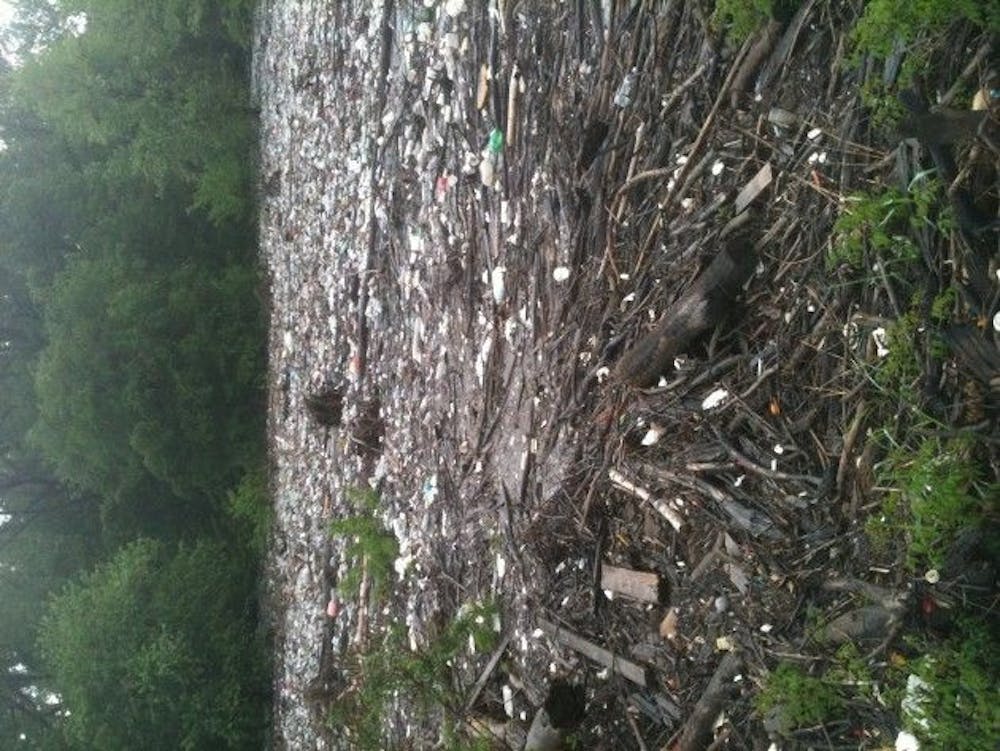When a Memphian throws a piece of trash on the ground, it will most likely end up in a storm drain. From there, it will go one of two places: the Wolf River or Nonconnah Creek.
If it's the latter, it will then be carried into McKellar Lake, an oxbow, or U-shaped bend, of the Mississippi River.
McKellar Lake was once a hot spot for recreation. Today, it is difficult to see the water beneath seemingly endless masses of plastic bottles, pollution and other waste scraps.
However, a group of students in the Helen Hardin Honors Program and the Memphis City Beautiful Commission hope to restore the polluted lake to its original state.
This effort began last month with a two-day spring break cleanup, during which thousands of pounds of trash were collected.
The next cleanup effort was scheduled for Saturday with Mayor AC Wharton, and 120 U of M students and other volunteers were expected to attend. However, it was postponed because experts predict that the Mississippi will be at its highest levels in 50 years after this week's forecasted storms.
Colton Cockrum, assistant director of the Helen Hardin Honors Program, is helping plan the cleanup efforts. After canoeing the river last fall, he said he saw the potential of the Mississippi River and hates to see it going to waste.
"I've seen the absolute beauty of it," Cockrum said, "and then you see this area of the river, and it's absolute filth."
Thien-Chuong Phung, senior biomedical engineering major and one of the cleanup effort's key planners, said that Living Lands and Waters, an environmental nonprofit organization, first pointed out McKellar Lake to him and Cockrum during the spring break cleanup.
"(Cockrum) and I saw this lake covered in 300 or 400 yards of trash, and it caught us by surprise," he said.
Phung said he even found a glass Gatorade bottle — which hasn't been sold in the United States for 13 years. According to Phung, it was so bad that Living Lands and Waters decided to devote the month of March for the next four years to cleaning the lake.
Phung and Cockrum weren't convinced that it would be enough.
"We figured if it was just a yearly thing, it was just going to build back up as if we didn't do anything," Phung said. "So it motivated us to pursue a monthly or regular cleanup of the area to make progress until Living Land and Waters returned to it."
Cockrum said that he has seen a large oil drum, appliances, a shopping cart and athletic equipment in the lake. Volunteers at the spring break cleanup even found a prosthetic leg floating on the water.
"I don't know how some of that stuff ends up there," Cockrum said. "It's crazy — hundreds of yards of floating trash. That trash sits there, and it will remain there, and any of the chemicals in it will get into the water supply, polluting the water and polluting the land."
Unfortunately, he said, volunteers at the spring break cleanup did not have the means to clean the thousands of plastic bottles they collected so they could be recycled. Cockrum said he hopes to someday be able to coordinate a "Recycle Day" where they can gather, clean and recycle the bottles.
Cockrum cited two main causes of this pollution problem. The first is Memphians' habits of overusing plastic bottles and not taking pride in their neighborhoods.
"The second problem," he said, "is that once trash gets into the Nonconnah, we have no way of stopping it from going in the river — no filter."
Cockrum acknowledged that with Memphis' current budget issues, it would be hard to find the funding to put a system in place to catch trash before it gets to the river. For now, groups of trash-collecting volunteers will have to do.
Cyndy Grivich, program coordinator for the Memphis City Beautiful Commission, said she hopes to reschedule for sometime in the summer.
"We are going to watch the water stages to make sure everything is safe and go back and do a cleanup," she said. "We will still have the full backing of the City of Memphis and Mayor Wharton."
Eldra White, executive director for the Memphis City Beautiful Commission, said that The U of M has been instrumental in efforts to protect the city's environment.
"The University of Memphis has helped first by providing volunteer support," White said, "and also by sending a message to fellow students to organize cleanup efforts on their own."
Phung said he has been extremely pleased with the response of U of M students and their willingness to help and has received support from many campus organizations.
"It's a community problem that the people of Memphis should be involved in," Phung said. "This is our city, and we should take care of it and not just hope that someone else would for us."
Phung said that he sees this service as a way to give back to the city that has given him so much.
"We don't have to make big bucks to do good in the world," he said. "Something small and simple like picking up trash can make a big difference."




